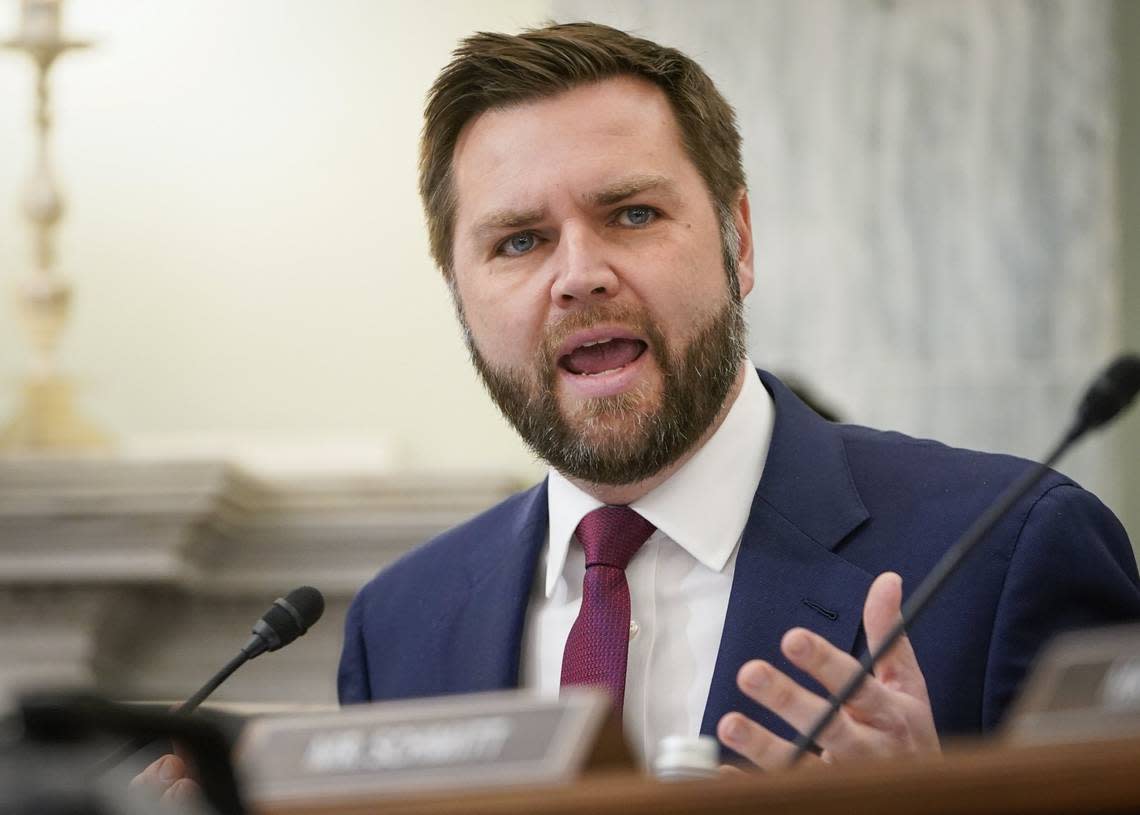What you need to know about Donald Trump’s running mate, JD Vance

- Oops!Something went wrong.Please try again later.
With Republican presidential candidate Donald Trump picking his running mate Monday, the party’s ticket is finally complete for the November general election. JD Vance will be the vice presidential candidate for the Republican Party.
The announcement came at the kickoff of the Republican National Convention, taking place this week in Milwaukee. Trump posted his decision on his social media site, Truth Social.
“After lengthy deliberation and thought, and considering the tremendous talents of many others, I have decided that the person best suited to assume the position of Vice President is J.D. Vance of the Great State of Ohio,” Trump wrote.
Here’s what you should know about Vance:
Hillbilly Elegy
James David Vance, 39, is a U.S. senator from Ohio elected in 2022 and sworn into office in January 2023. As a candidate, he received Trump’s endorsement.
He is mostly known for being a best-selling author of Hillbilly Elegy, a memoir of his experiences growing up in a dysfunctional family in Kentucky and Ohio that gives a look at the struggles of America’s white working class.
His memoir put him on the national stage as people were trying to understand the rise of Donald Trump and what led him to the White House. It was turned into a Netflix movie in 2020.
MAGA Conversion
When Trump first ran for president in 2016, Vance was a staunch critic, describing himself at one point as a “Never Trumper.”
But Vance, like many Republicans, came around on Trump. And in his short time in office, he has aligned himself with Trump’s political agenda and is considered a consistent MAGA supporter in the Senate. He is a critic of U.S. engagement in foreign conflicts and has expressed hard-line immigration rhetoric.
Vance was among the first Republicans to react to the recent assassination attempt against Trump this Saturday, by writing on his X social media account: “Everyone join me in praying for our President Trump and everyone at that rally. I hope everyone is ok.”
He later said that the incident was not isolated and implied that Democrats’ rhetoric towards Trump led to the attempt.
Today is not just some isolated incident.
The central premise of the Biden campaign is that President Donald Trump is an authoritarian fascist who must be stopped at all costs.
That rhetoric led directly to President Trump's attempted assassination.— J.D. Vance (@JDVance1) July 14, 2024
Education and Personal Life
After graduating from high school, Vance served in the Marine Corps as a public affairs marine in Iraq and later attended Ohio State University and Yale Law School.
He has been married to Usha Chilukuri Vance, the daughter of Indian immigrants, since 2014. The pair met at Yale, hen they were both students. They have three children together.
Usha Vance is a litigation associate for Munger Tolles & Olson and has represented big corporations such as Walt Disney Enterprises and its subsidiary Buena Vista Books and PG&E Corp.
Before joining the law firm, which has taken cases before the U.S. Supreme Court and federal appeals panels, she worked as a law clerk for Supreme Court Chief Justice John Roberts.
Prior to that, she also clerked in the U.S. District Court for the Eastern District of Kentucky and for Justice Brett Kavanaugh when he was on the U.S. Court of Appeals for the D.C. Circuit.
Religion
Vance grew up with Christian values, instilled by his grandmother, nicknamed Mamaw. In 2019, he converted to Catholicism. He was baptized at St. Gertrude Priory, in Cincinnati, Ohio.
In a 2019 interview with The American Conservative, Vance said that he didn’t grow up with attachments to any denomination and he was never baptized. “When I became more interested in faith, I started out with a clean slate, and looked at the church that appealed most to me intellectually,” he said.
He also said that his views on public policy are “pretty aligned with Catholic social teaching” and that was one factor that drew him to the Catholic Church.
Supported legislation
As a Senator, Vance has worked on bipartisan legislation. He introduced a bill on rail safety with Democratic Sen. Sherrod Brown after the train derailment in East Palestine, Ohio, and worked with Sen. Elizabeth Warren on a bill to hold executives accountable for failed banks.
He co-sponsored a bill with U.S. Sen. Sheldon Whitehouse to eliminate an existing tax exemption when the businesses involved in a merger are worth $500 million or more.

